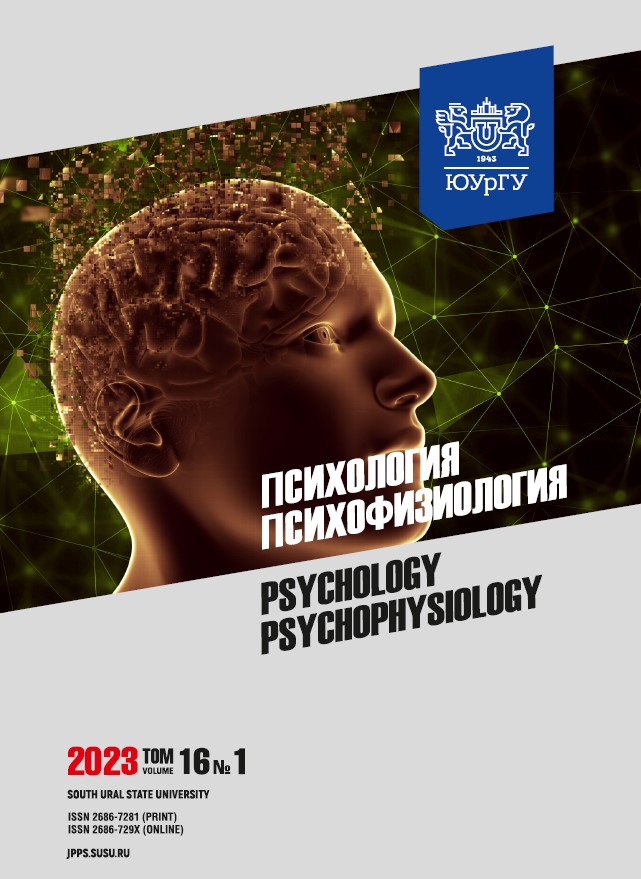Personal resources of academic success in students from subject-specific classes
Abstract
Introduction. The relevance of this study is set by the search for predictors and factors that contribute to the intellectual and creative potential of gifted students in subject-specific classes. Particular attention is paid to the existential and psychological aspects of personal resources associated with academic success among highly motivated students. Aim: the purpose of this paper is to identify the structure and content of the factors that influence students' personal resources for academic success in subject-specific classes.
Materials and methods: The study involved 157 students from subject-specific schools in the Leningrad region. Two groups were formed and consisted of the students of the seventh (54 people) and tenth (52 people), respectively. A battery of tests included the following: the Hardiness Survey by S. Maddi, the Existence Scale by A. Langle, a multidimensional inventory of loneliness experience by E. Osin and D. Leontiev, the Purpose-in-Life test by D. Leontiev, and the Zimbardo time perspective inventory. The data obtained were processed with descriptive statistics, factorial analysis, and comparative analysis.
Results. The results obtained showed structural differences determined by the existential and psychological characteristics of students in subject-specific classes. The factor matrix of 10th grade students is a system of more complexly structured factors containing various existential and psychological characteristics. This represents academic success as a phenomenon that comprises educational achievements and cognitive learning styles and integrates existential and psychological characteristics in the personalities of students from subject-specific schools. Conclusion. The paper contains an analysis of purpose-in-life perspectives, features of hardiness, time perspectives, existential aspects, and the loneliness experience as personal resources for academic success in the seventh and tenth grades of subject-specific classes. This study presents one aspect of the genesis of the existential formation of gifted students in a subject-specific environment.
Downloads
References
2. Doniy E.I., Shumakova N.B. Comparative analysis of cognitive characteristics and creativity of younger adolescents with intellectual and artistic gifts. Psikhologicheskiye issledovaniya = Psychological research. 2020;12(3):110–123. (in Russ.). DOI: https://doi.org/10.17759/psyedu.2020120307
3. Serpionova, E. I. Psychological differences in students of specialized classes. Profilnaya shkola = Profile school. 2009;6:43–47 (in Russ.)
4. Dirik A., Bogdanova O.E., Kovas Yu.V. Study of the relationship between academic achievements and socio-economic status, cognitive abilities and self-assessment of mathematical abilities of high school students. Teoreticheskaya i eksperimentalnaya psikhologiya = Theoretical and experimental psychology. 2012;5(4):5–19 (in Russ.)
5. Shibkova D.Z., Baiguzhin P.A., Erlikh V.V. et al. Selection and medical and biological sup-port of gifted students implementing educational and sports activities. Science for Education To-day. 2020;10(5):196–210. DOI: https://doi.org/10.15293/2658-6762.2005.11. (in Russ.).
6. Morosanova V.I., Fomina T.G., Kovas Yu.V. The relationship between regulatory, intellec-tual and cognitive characteristics in students who are successful in mathematics. Psikhologicheskie issledovaniya = Psychological research. 2014;7(34):11.
7. Markina N.V. Modern studies of choice in the context of the psychology of the develop-ment of giftedness: a classical paradigm. Vestnik Chelyabinskogo gosudarstvennogo pedagog-icheskogo universiteta = Bulletin of the Chelyabinsk State Pedagogical University. 2018;3:233–245. (in Russ.). DOI: https://doi.org/10.25588/CSPU.2018.03.24
8. Gryazeva-Dobshinskaya V.G., Maltseva A.S. “Typology of personal choice of life path”: description of the methodology and results of psychometric testing. Vestnik Yuzhno-Uralskogo gosudarstvennogo universiteta. Seriya: Psikhologiya = Bulletin of the South Ural State University. Series: Psychology. 2016;9(2):14–21. (in Russ.). DOI: https://doi.org/10.14529/psy160202
9. Markina N.V., Soldatova E.L., Kachuro I.L., Gavriliuc A. Personal and existential-psychological resources of form tutors working with gifted children. Obrazovanie i nauka = Education and science. 2021;23(1):102–135. (in Russ.). DOI: https://doi.org/10.17853/1994-5639-2021-1-102-135
10. Maddi S.R. Hardiness as the Existential Courage to Grow Through Searching for Meaning.
The Experience of Meaning in Life. Hicks J., Routledge C. (eds). New York: Springer, Dordrecht. 2013:227–239. DOI: https://doi.org/10.1007 / 978-94-007-6527-6_18
11. Makhnach A.V. Human vitality in the face of uncertainty. Organizatsionnaya Psikhologiya i Psikhologiya truda = Organizational Psychology and Psychology of Labor. 2020;5(4):131–166. (in Russ.). DOI: https://doi.org/10.38098/ipran.opwp.2020.17.4.006
12. Rylskaya E.A., Vasilyeva S.V. Construction of the definition of the concept of “the viability of a professional”. Yaroslavskiy pedagogicheskiy vestnik = Yaroslavl Pedagogical Bulletin. 2019;2(107):106–113. (in Russ.). DOI: https://doi.org/10.24411/1813-145X-2019-10358 (in Russ.).
13. Leontiev D.A., Rasskazova E.I. Test zhiznestoikosti [Hrdiness test]. Мoscow: Smysl. 2006:63. (in Russ.).
14. Mainina I.N., Vasanov A.Yu. Standardization of the methodology “Scale of Existence” by A. Lenglet, K. Orgler. Psikhologicheskii zhurnal = Psychological journal. 2010;31(1):87–99. (in Russ.)
15. Leontiev D.A. Test smyslozhiznennykh orientatsii [Test of meaningful life orientations]. Мoscow: Smysl. 2000:19. (in Russ.).
16. Dementy L.I., Koroteeva E.M. Personality types and socio-psychological determinants of loneliness in adolescence. Omskiy nauchnyy vestnic = Omsk Scientific Bulletin. 2010;4(89):97–101.
References on translit
-Copyright (c) 2023 Psychology. Psychophysiology

This work is licensed under a Creative Commons Attribution-NonCommercial-NoDerivatives 4.0 International License.



